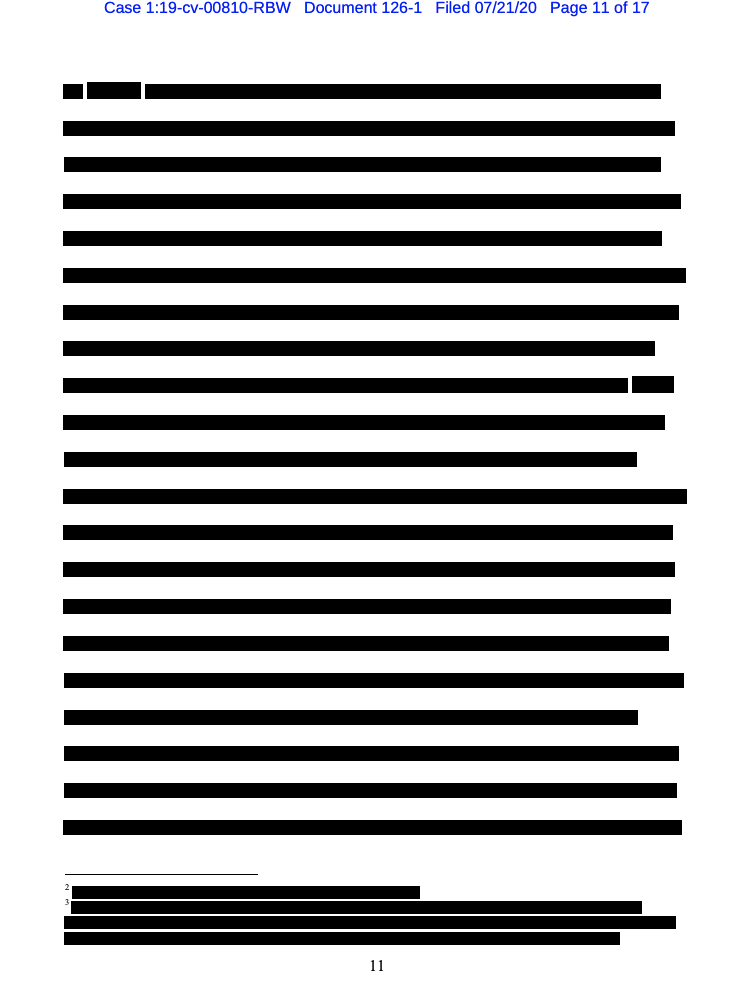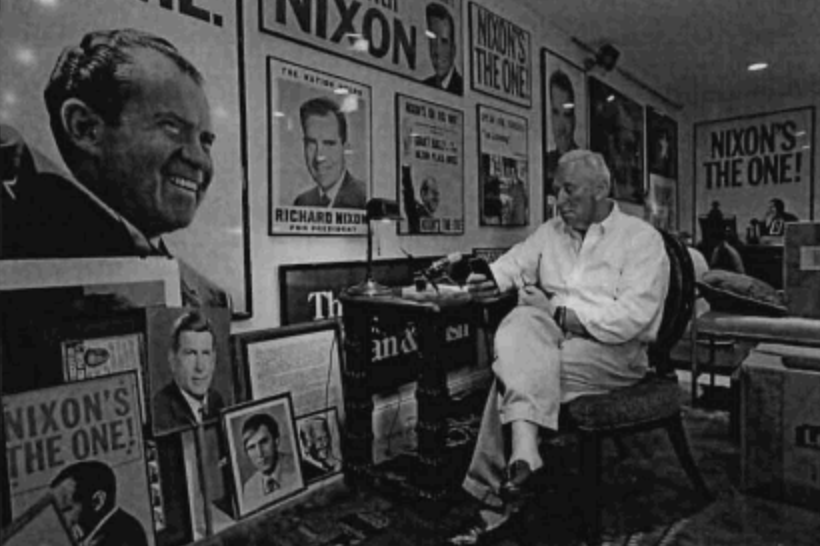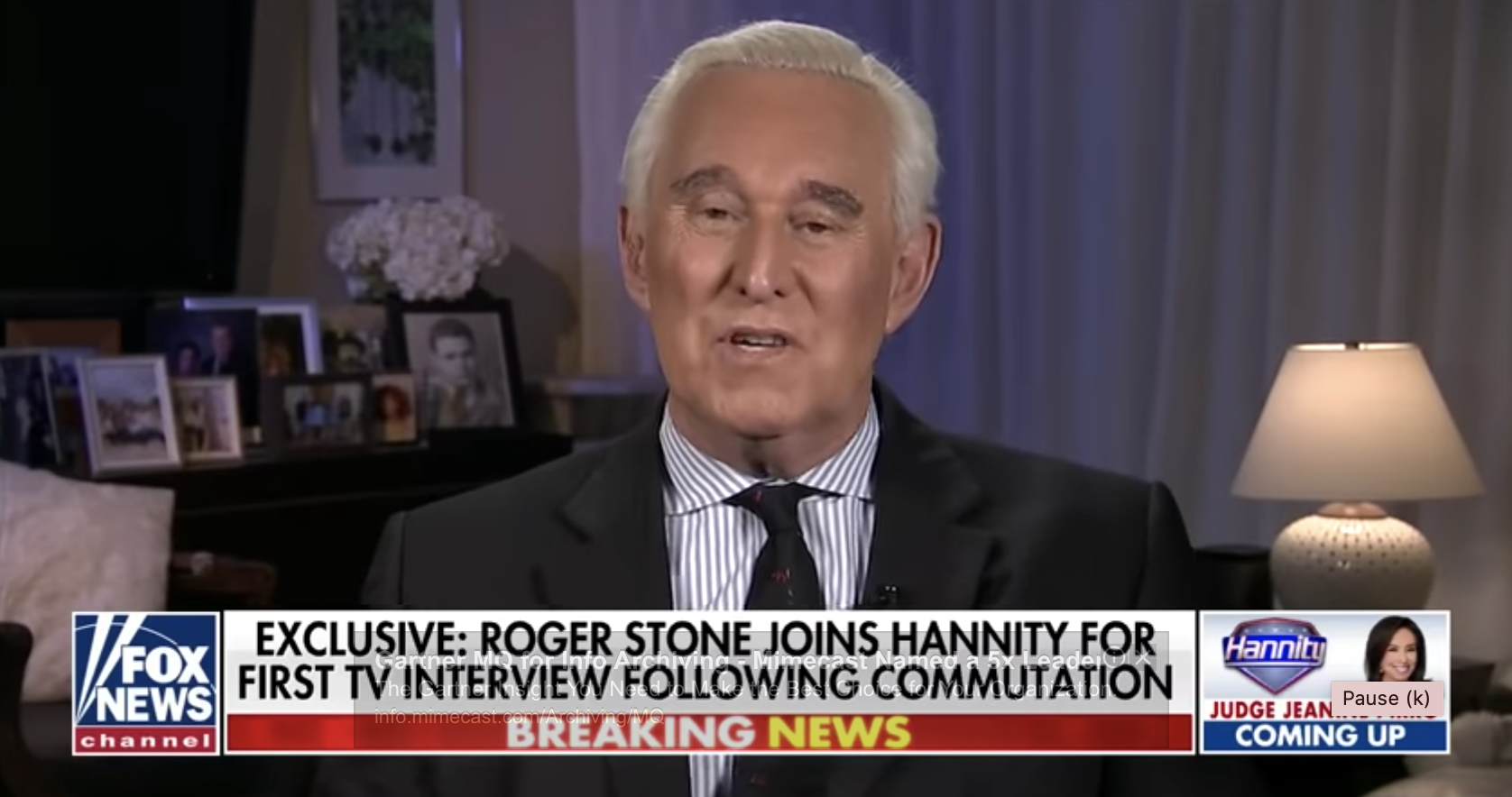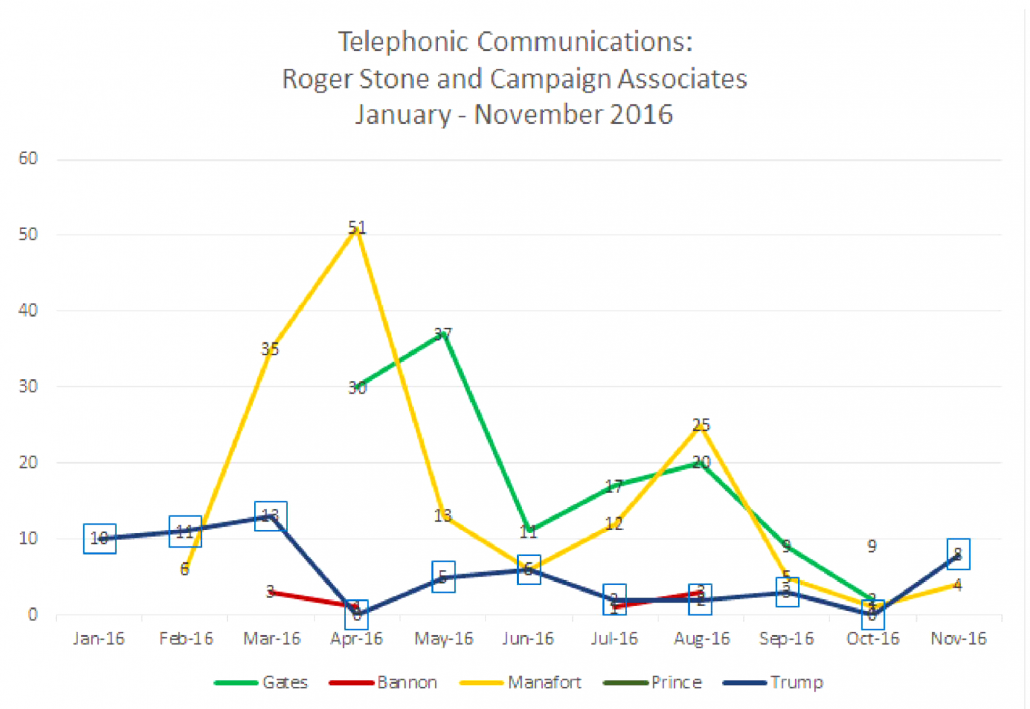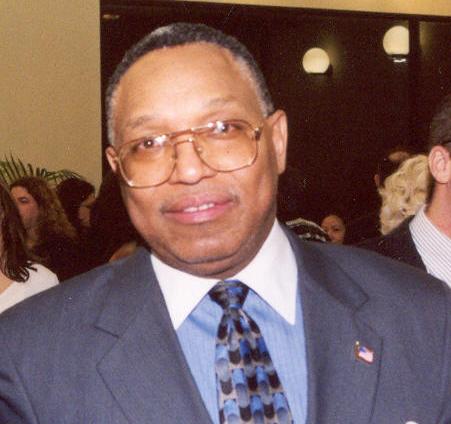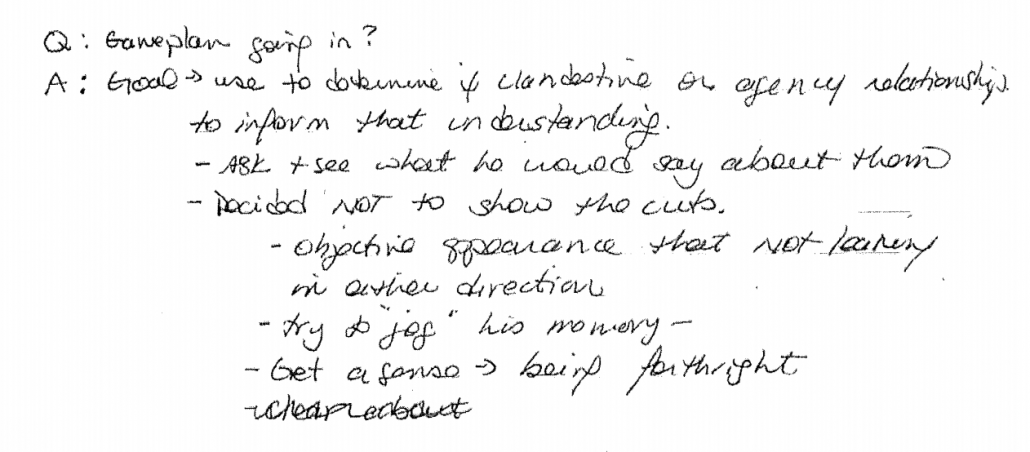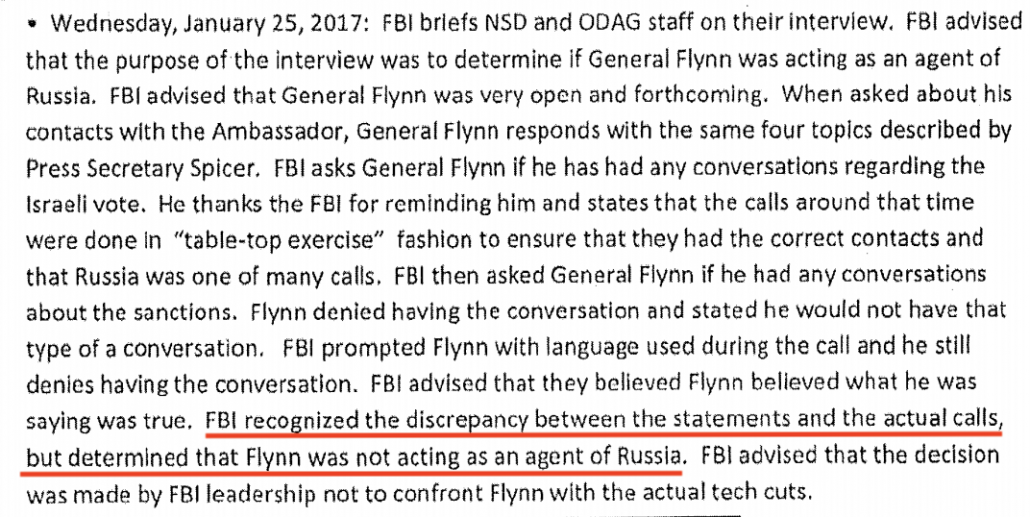According to the interview report from Christopher Steele’s Primary Subsource, the PSS confirmed that he had two sources behind the reporting that Carter Page met with Igor Sechin. He said one of those two sources — whom he described having ties to FSB — told him that Russia was sitting on kompromat against Trump (and Hillary). He described that his source for all the Michael Cohen reporting came from an old friend whom he trusted 100%. Steele’s Primary Subsource even took credit for some of the specific phrases in the Steele dossier — such as the one describing Michael Cohen’s efforts to sweep the Carter Page and Paul Manafort scandals “under the carpet.”
Even the Primary Subsource’s interactions with a person he believed to be Sergei Millian tracked most of the report based off the call.
[PSS] recalls that this 10-15 minute conversation included a general discussion about Trump and the Kremlin, that there was “communication” between the parties, and that it was an ongoing relationship. [PSS] recalls that the individual believed to be [Millian] said that there was an “exchange of information” between Trump and the Kremlin, and that there was “nothing bad about it,” Millian said that some of the information exchange could be good for Russian, and some could be damaging to Trump, but deniable. The individual said that the Kremlin might be of help to get Trump elected, but [PSS] did not recall any discussion or mention of Wikileaks.
The passage shows how badly DOJ IG over-read the interview when it first published the report and affirmatively stated that PSS “had no discussion” or “made no mention at all of” WikiLeaks.
On pages xi, 242, 368, and 370, we changed the phrase “had no discussion” to “did not recall any discussion or mention.” On page 242, we also changed the phrase “made no mention at all of” to “did not recall any discussion or mention of.” On page 370, we also changed the word “assertion” to “statement,” and the words “and Person 1 had no discussion at all regarding WikiLeaks directly contradicted” to “did not recall any discussion or mention of WikiLeaks during the telephone call was inconsistent with.” In all instances, this phrase appears in connection with statements that Steele’s Primary Sub-source made to the FBI during a January 2017 interview about information he provided to Steele that appeared in Steele’s election reports. The corrected information appearing in this updated report reflects the accurate characterization of the Primary Sub-source’s account to the FBI that previously appeared, and still appears, on page 191, stating that “[the Primary SubSource] did not recall any discussion or mention of Wiki[L]eaks.”
To be sure, the provenance of that claimed Millian conversation is an utter shitshow — consisting of a call with someone the Primary Subsource believed, but had no way of confirming, was Millian. But Steele’s Primary Subsource did confirm that most of that report tracked the call, whoever it was from.
Still, you wouldn’t know that the Primary Subsource described the multiple sources behind key allegations in the dossier from the way the DOJ IG Report described what was a raw intelligence report. For example, this passage doesn’t reveal that the Primary Subsource heard details on Page’s trip from people with high level connections, including the meeting with Sechin (remember, the FBI had another source report that he had heard rumors about the Sechin meeting, which probably partly explains why Mueller concluded that Page’s whereabouts in Russia were still uncertain).
A second example provided by the Primary Sub-source was Report 134’s description of a meeting allegedly held between Carter Page and Igor Sechin, the President of Rosneft, a Russian energy conglomerate. 337 Report 134 stated that, according to a “close associate” of Sechin, Sechin offered “PAGE/ TRUMP’s associates the brokerage of up to a 19 percent (privatized) stake in Rosneft” in return for the lifting of sanctions against the company. 338 The Primary Sub-source told the FBI that one of his/her subsources furnished information for that part of Report 134 through a text message, but said that the sub-source never stated that Sechin had offered a brokerage interest to Page. 339 We reviewed the texts and did not find any discussion of a bribe, whether as an interest in Rosneft itself or a “brokerage. ” 340
The IG Report also repeats uncritically stuff from both the PSS and his sources that is pretty obviously bullshit, such as the claim from the PSS — who had been paid full time by Orbis for years to collect this intelligence — that he didn’t expect his reporting to show up in written reports.
The Primary Subsource also stated that he/she never expected Steele to put the Primary Subsource’s statements in reports or present them as facts. According to WFO Agent 1, the Primary Sub-source said he/she made it clear to Steele that he/she had no proof to support the statements from his/her sub-sources and that “it was just talk.” WFO Agent 1 said that the Primary Sub-source explained that his/her information came from “word of mouth and hearsay;” “conversation that [he/she] had with friends over beers;” and that some of the information, such as allegations about Trump’s sexual activities, were statements he/she heard made in “jest.”341 The Primary Sub-source also told WFO Agent 1 that he/she believed that the other sub-sources exaggerated their access to information and the relevance of that information to his/her requests.
Or the claim from a subsource who would be the key source of disinformation in the dossier if such disinformation exists that nothing in the dossier was attributable to her.
FBI documents reflect that another of Steele’s sub-sources who reviewed the election reporting told the FBI in August 2017 that whatever information in the Steele reports that was attributable to him/her had been “exaggerated” and that he/she did not recognize anything as originating specifically from him/her. 347
Nor would you know that from the reporting on the interview report of the Primary Subsource, released last night by Lindsey Graham.
Ultimately, the belated assessment of the Supervisory Intel Analyst probably appropriately attributes blame for problems with the dossier to multiple sources; a lot of the problems with this dossier stem from communication breakdowns and exaggerations from multiple people trying to make a buck.
According to the Supervisory Intel Analyst, the cause for the discrepancies between the election reporting and explanations later provided to the FBI by Steele’s Primary Sub-source and sub-sources about the reporting was difficult to discern and could be attributed to a number of factors. These included miscommunications between Steele and the Primary Sub-source, exaggerations or misrepresentations by Steele about the information he obtained, or misrepresentations by the Primary Sub-source and/or sub-sources when questioned by the FBI about the information they conveyed to Steele or the Primary Sub-source.
Let me be very clear: none of this means these allegations are true, nor does this excuse the failures to alert the FISA Court to key problems in the dossier. I was one of the first people to raise doubts about some of the problems with the allegations in the dossier, and I stand by that.
Operational security
What’s more interesting about the interview are the hints of all the ways the dossier could have gone so badly wrong. The interview report describes multiple ways that Russia’s spooks might have found out about the project and fed it with disinformation (the footnotes declassified earlier this year describes that several Russian spooks knew of the project after what would have been the PSS’ first trip to Russia to do the reporting).
Steele’s PSS was an analyst by training that Steele increasingly used in an operational role (including by getting him hired at some kind of consulting company that seems to have served as a kind of cover for his travel to Russia). The arrangement seems to have had spotty operational security. For better and worse, PSS said that he rarely took substantive notes.
[PSS] was asked if he takes notes on the information he is collecting from his sources, or if he keeps any kind of records. He was told by Steele that it is a security risk to take notes; he hasn’t kept notes or electronic records. He occasionally makes scribbles and/or chicken scratch notes here and there, but gives verbal debriefs in [redacted] following his trips [to Russia].
PSS would then share the information with Steele, whom he always briefed alone (making misunderstandings more likely). He had no communications with Steele while in Russia. PSS described that his debriefings with Steele were always at the Orbis office, which meant if Steele himself were surveilled, PSS’ ties to Steele would become obvious.
PSS was originally tasked to investigate Manafort (which he had little success on), at a time when Fusion was still being paid by Paul Singer, meaning this interview seems to confirm, once and for all, that not just Fusion’s reporting, but Steele’s, was initially paid for by a Republican. PSS specified for that reporting he did some of his reporting to Steele via an encrypted app.
But his communications with Steele included many insecure methods. He first met Steele in a Starbucks. Early on, he communicated with him via email and Skype, and Steele would task him, at least in part, via email. He described discussing Page’s trip to Russia with Source 3 on some kind of voice call, possibly a phone, while he was at a public swimming pool, though he also described talking in an opaque way about election interference. Likewise, the most problematic December 13 report was based on a conversation with the same source, which was also a phone call.
In short, while Steele and PSS and PSS’ sources made some efforts to protect their communications from the Russians that surely considered Steele a target, those efforts were inconsistent.
PSS described making three trips to Russia for his election year reporting. On the second trip, he got grilled suspiciously at the border. On his third, “nothing bad happened,” which made PSS suspicious about how perfectly everything had gone.
PSS repeatedly described being uncomfortable with the election year tasking, and he seems to have had suspicions in real time that Russia had taken note of it.
Ties to intelligence
Meanwhile, for all the reports that PSS was “truthful and cooperative,” the interview report describes that he “balked, meandered in the conversation, and did not really answer the question” about whether he used other sources for his election year reporting aside from the six he described to the FBI. And, as laid out in the interview report, it became increasingly clear over the three days of interviews that PSS was not entirely forthcoming about any interactions he had had with Russian intelligence.
This started with his lawyers’ careful caveat at the beginning of the process that PSS did not have any contacts with people he knew to be part of the Russian intelligence services (the interview as a whole was conducted under a proffer).
[PSS] indicated, to his knowledge, he has not had any contacts with the Russian intelligence or security services. [ANALYST NOTE: His attorney emphasized “to his knowledge” during this part of the discussion.]
PSS said he had contact with Russian government officials, but — “as far as he … knew,” not with anyone in SVR, GRU, or FSB.
On day three, however, PSS described a friend (whose experience he drew on for a report on how Russia coerces criminal hackers to work for the intelligence services) who had had been busted for involvement with online pornography and pressured to work with the FSB. The Senior Intel Analyst noted that conflicted with his earlier claim to have no known ties to Russian spooks.
[ANALYST NOTE: This is in contradiction to [PSS’s] statement the first day, at which time he indicated that he did not have any contacts associated with the Russian intelligence and security services.]
Later that same day, PSS seemed to acknowledge that a Russian official and a Russian journalist he interacted with were spooks. The FBI noted,
[ANALYST NOTE: This contradicted [PSS’s] earlier statements regarding having no contact with Russia’s intelligence and security services, and it also contradicted regarding not really knowing if [a Russian official] was actually connected to Russia’s intelligence and security services.]
The EC goes on to describe PSS “brush[ing] aside the idea of being approached by the intelligence and security services” while he was a student.
This squirreliness about his own ties with Russian spooks was probably just self-preservation, an effort to avoid any exposure on 18 USC 951, but it is probably the key issue where the FBI questioned his candor in real time.
Countertasking
Meanwhile, PSS described at least three of his sources — Source 1, Source 2, and Source 3 — in such a way that led the FBI to wonder whether PSS was being tasked by his own sources. S1, for example — who has a close relationship to a Russian intelligence officer (probably FSB) — always asks PSS to do projects together.
[S1] is always trying to get [PSS] to start projects and make money together — [PSS] related how [S1], like others, is always asking questions like, “Can you get us some projects?” or “Can you get us financing?” or “Let’s do something together dealing with [redacted]!” [PSS] doesn’t consider this as his source “tasking him” but as simply the normal course and scope of networking in these circles. [PSS] did help [S1] with an academic book about [redacted].
And both Source 2 and Source 3 — the sources for some of the more problematic information in the Steele dossier — knew PSS brokered intelligence. Both also discussed brokering information in Russia.
[S3] is one of the individuals who knows that [PSS] works for due diligence and business intelligence. [As an aside at this point, [PSS] insisted that [S2] probably has a better idea about this than does [S3] because [S2] is always trying to monetize his relationship with [PSS]. [PSS] reiterated again to interviewers that [S2] will often pitch money-making ideas or projects — “Let’s work together. I [S2] can try and get [redacted] to answer a question, but I’ll need some money to do it.”] [S3] has an understanding that [PSS] is “connected.” In fact, either [redacted] morning or [redacted] morning, [S3] reached out to [PSS] and asked him for help in [redacted] on how [redacted] living in the United States are viewing the Trump administration. She is asking him [redacted] by the weekend, probably so she can sell it to a friend in Moscow.
And because PSS asked Orbis to help S1 — the guy with close ties to an FSB officer — get a scholarship for language study in the UK, S1 presumably knows what Orbis and who Steele is.
In addition to S1, Source 5 also has ties to Russian intelligence. This showed up in footnote 339, which was partly declassified earlier this year.
This is to be expected, of course. Indeed, the dossier prominently touts the intelligence sourcing of its allegations, as I noted the first day the dossier was published. If the person on whose source network Steele was relying didn’t have ties to spooks, it would be as problematic.
The thing, though, is that it’s certain now that many of the allegations in the dossier are not true or were rumor, particularly virtually all the allegations sourced to Source 3 (the source for all the Michael Cohen reporting), PSS’s childhood friend whom he trusts 100%. That’s true even though generally the reports were sourced to people with at least indirect access to senior level officials.
All the huffing and puffing aside, that should be the takeaway from this. Steele was definitely not collecting this intelligence in optimal fashion, and sharing it with the press made things far worse. But in January 2017, it looked like raw intelligence, of varying quality, which is precisely what it was billed at. Yet, well before any pitches Steele made to the press, it seems some really well-connected people in Russia were feeding Steele’s PSS information that distracted from the real events going on and focused it elsewhere.
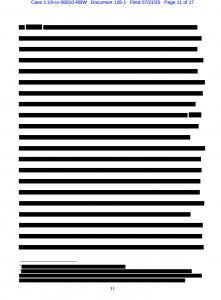 DOJ just filed their answers to Judge Reggie Walton’s questions in the EPIC/BuzzFeed FOIA for the Mueller Report. While those are entirely sealed, a new declaration from Vanessa Brinkmann is available, albeit in heavily redacted form.
DOJ just filed their answers to Judge Reggie Walton’s questions in the EPIC/BuzzFeed FOIA for the Mueller Report. While those are entirely sealed, a new declaration from Vanessa Brinkmann is available, albeit in heavily redacted form.
